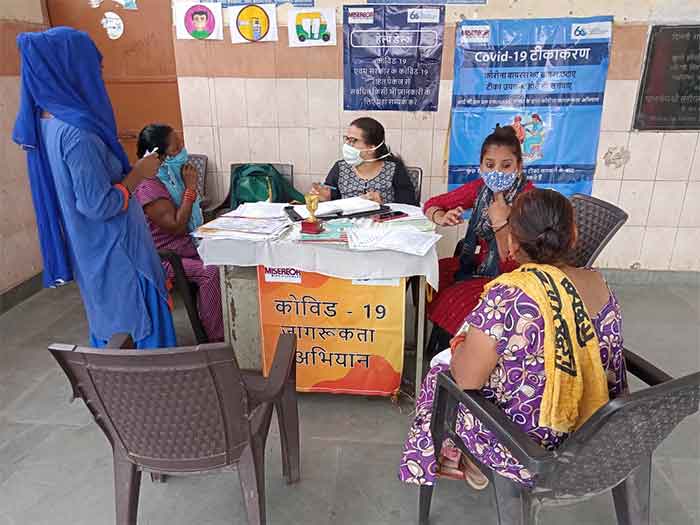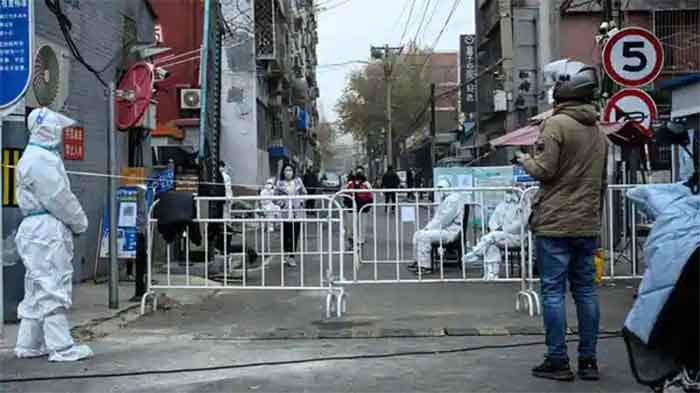
A survey study conducted by the Indo Global Social Service Society has found that only 2% of slum/basti dwellers have been fully vaccinated (with 2 doses) and that a little over 16% of them have received their first dose since the vaccination was made available for all above 18.
As the second wave of COVID-19 cases sweeps India, informal sector workers are unable to avail the vaccination because of many reasons. Knowledge of where to get vaccinated, how to register for the jab and other eligibility criteria are unknown to large populations of basti dwellers in cities. There is also a significant population of urban poor that fear losing a day’s pay to get the jab, or possible side effects that could force them to skip work for longer.
Scope of Study
The survey is based on responses from more than 670 urban poor residents across slums/bastis from 13 different cities namely Bhopal, Jabalpur, Indore, Guwahati, Gorakhpur, Nagpur, Ranchi, Jamshedpur, Durg, Raipur, Patna, Bhubaneswar and Delhi. The survey was conducted over a 10 day period starting from the 3rd week of May till the final week (17 May to 27 May). At this time more 3 weeks had passed since the vaccine had been declared universally available for all above 18 years of age in India. The sample of the survey included informal sector worker groups such as construction workers, domestic workers, street vendors, waste pickers, rickshaw pullers, shop assistants, cobblers, tailors and so on, who reside in informal settlements (or slums) in the 13 cities across 9 states and there were 50 respondents from each city.
47% of the respondents were between 30-45 years. Respondents from the 18-30 age group constituted 25% and 45-60 constituted 25% as well. Over 2% of the respondents were above the age of 60. Almost one-third (64%) of all respondents were female and the rest were male. It is reported that due to a lack of proper information being spread about the vaccines, there is a greater fear about the vaccines amongst women who think pregnancy and fertility gets affected, and are therefore less willing to be administered with the jab.
Vaccine Coverage Findings
Only 5% (23 out of 401) of the respondents from the age group of 18-45 have been vaccinated with one dose. However over 38% (74 out of 193) of the respondents from the age group of 45+ have been vaccinated with one dose.
Over 86% of the respondents were aware of the vaccine and its use though participation in previous vaccination drives has been relatively low amongst members of the urban poor. 70% of the respondents have heard about the vaccine registration application and the website but are mostly unable to book a slot themselves. The survey found that 35% of the respondents were hesitating and were not ready to take the vaccine if it was available to them.
Fears of Vaccine
58% of the respondents don’t want to take the vaccine because they heard of people having lost lives after taking the vaccines. 8% of the respondents said that they cannot waste their day’s wages on getting the jab. The fear of falling temporarily sick resulting in a loss of 2-3 days wages is also a major source of hesitancy.
37% of the respondents are fearful of getting sick after getting the vaccine. Other issues included fear of the vaccine due to being pregnant, having co-morbidities like BP issues, diabetes and other illnesses. An acute lack of digital literacy and being unaware of vaccine locations are also some of the major reasons behind the low rates of vaccination. Rumours over WhatsApp that blame vaccines for a host of illnesses, and fake news that the vaccines can cause infertility are widespread.
Out of those who got vaccinated, 85% walked to government vaccine facilities and got registered. Only 15% of them registered themselves on the CoWin website. 97% of the respondents who tried to get a vaccine went to the government hospitals providing evidence of the obvious facts of the urban poor not being welcomed into private establishments or vaccination centres.
Ration and Livelihood Findings
The Indo Global Social Service Society also included in their survey sections on livelihood and ration availability which, unsurprisingly bore grim results as well. 86% of all respondents said that their livelihoods were significantly hindered during the past 2-3 months. 89% of the respondents did not receive any financial or material help from the government. The ones that did were mainly from Madhya Pradesh and Maharashtra who had announced cash transfers of INR 1000 and 1500 for street vendors and other informal workers early in April.
38% of respondents said they had not received any rations in the past week or month. This survey was taken when the second wave was at its peak and lockdowns were prevalent almost everywhere. In that time, almost 40% of those with ration cards were unable to receive or get any rations. Of those who did get rations, only 10% received pulses (dal) and cooking oil. Less than 1% ration card holders received vegetables in their monthly/weekly rations. This was seen in the previous lockdown as well when rice was overabundant in the ration kits but without much else.
When respondents were asked if they were aware of COVID mutated strains that may cause a 3rd wave, almost two-thirds (63%) of them said they knew about the variants. 36% of the respondents did not know about the mutant strains and the future dangers.Although 96% of the respondents wore masks, only a third of them (33%) wore double masks revealing either a lack of awareness of airborne strains or a lack of masks with the urban poor communities.
Policy Recommendations
The report concluded by suggesting a number of policy changes, some of which include:
For Enhancing Vaccinations Amongst Urban Poor
- Community Help desks: Establish help/registration desks in every urban poor community/slum to facilitate registration and spread awareness about the vaccine
- Community Task Force: Establish community COVID-19 vaccine task forces of community leaders and youth groups to spread awareness and ensure maximum vaccine coverage through constant community interaction.
- Training of Community Task Force: Training to be provided to community task force so they can successfully carry out a vaccine drive to dispel misinformation and increase vaccine registration
- Priority to urban poor informal sector: Make inclusiveness of marginal groups a priority of vaccine policy so that informal sector workers and urban poor can get preference in vaccine availability in all states
- Welfare Boards vaccination for members: Asking worker-welfare boards such as the BoCW, Town Vending Committees etc to procure and provide vaccination support for members, as private organisations and offices are currently doing
Food And Financial Assistance
- Cash Transfers: Financial assistance in the form of direct cash transfers for informal sector workers should be undertaken by respective governments.
- Rations for All: PDS centres must be open to all, especially to those workers/families who do not have ration cards
- Free Cooked Food Canteens: Subsidised and free cooked food to be provided through canteens and community kitchens in multiple locations throughout cities. CSOs and NGOs must be included for this
Adrian Dcruz is working as a Urban Researcher at Indo Global Social Service Society, a non-profit organisation in Delhi. He is closely working on issues of street vendors and urban housing.
GET COUNTERCURRENTS DAILY NEWSLETTER STRAIGHT TO YOUR INBOX
















































